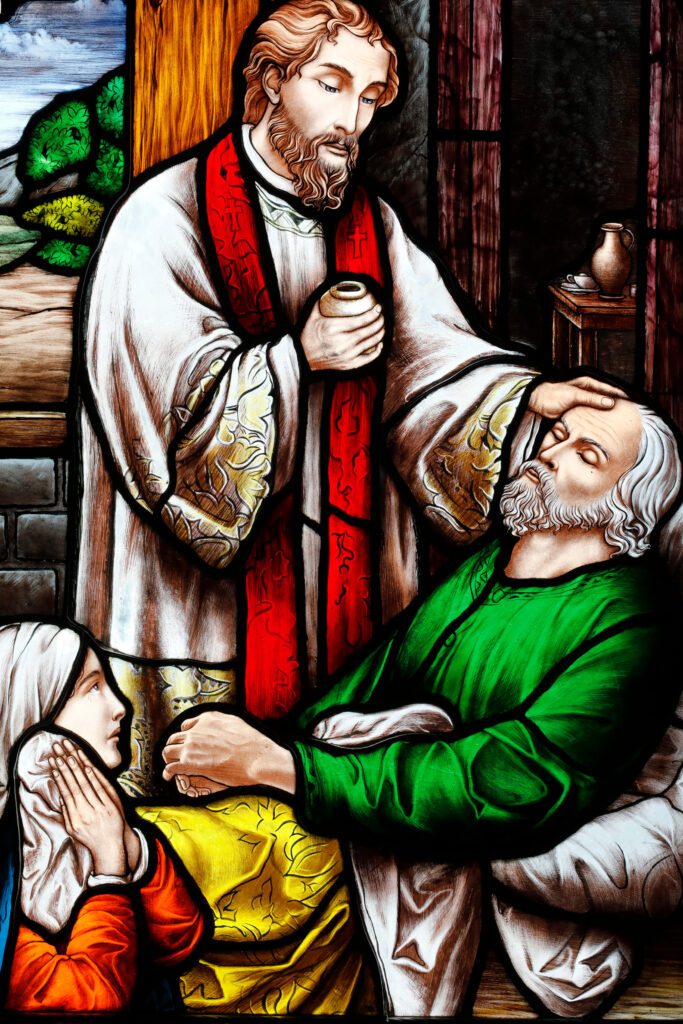Baptism
Apart from marriage, the baptism of a child is one of the most grace-filled moments in the life of a family. When a mother learns that she is with child, a family often begins to plan showers and to prepare a nursery, all of which are worthy practices. But in preparing for a child’s birth, we should never forget to prepare for a child’s rebirth into the Body of Christ through that initial sacrament of Baptism. In Baptism, an indelible (albeit invisible) mark is placed upon us that sets us aside. We are forever claimed as a son or daughter of God as well as a soldier of Christ, members of the Church Militant. As such, we are also called to be future saints with God’s great grace. Spiritual preparation is essential, then, not only in getting the ceremony and sacrament completed, but also in preparing another soul to be raised up in a godly and Christian way.
To have your child baptized at Mary Our Queen, please submit a Baptism Registration Form (LINKED ONLINE HERE or by obtaining a paper form available in the parish office). Once we have received the registration form:
- We will confirm you have been registered at Mary Our Queen for at least six (6) months prior to the baptismal date, you regularly attend Mass, and are in good standing with our parish
- You will be contacted by the Baptism Coordinator (Todd Coury) who will:
- Review the process with you and get any additional questions answered
- Collect required paperwork if you did not turn it in when you completed the Baptism Registration Form:
- Letter of Good Standing for your child’s godparents, signed by the pastor of their home parish
- Child’s birth certificate (unless you register before the child’s birth)
- Once all paperwork has been received, the Baptism Coordinator will register you for a parent Baptism preparation class
- Attend the parent Baptism preparation class
- After attending, schedule the Baptism of your child with the Baptism Coordinator
Normally, baptisms are celebrated at Mary Our Queen at either the 8:30 am or 11:00 am Sunday mass. However, private or semi-private baptisms are allowed, subject to the schedule of the deacons and church availability.
What do we learn in the class?
Our program, Belonging: Baptism in the Family of God, prepares families for the beautiful Sacrament of Baptism, while reminding them of who they are as God’s children and the significance of their vocation. It is designed to provide parents with an incredible encounter with Jesus and His Church. In addition to preparing parents to have their children baptized, this program will help parents learn what it means to be a child of God and that in the Church, they will always have a place where they belong.
- Upcoming Schedule for Parent Baptismal Preparation Classes
- JULY: Sunday, 7/13/25
- AUGUST: Sunday, 8/3/25
- SEPTEMBER: Sunday, 9/7/25
- OCTOBER: Sunday, 10/5/25
- NOVEMBER: Sunday, 11/2/25
- DECEMBER: Sunday, 12/7/25
Who can be a Godparent?
According to Church law, godparents and sponsors must be people who lead and live a Christian life, in other words, they must be practicing Catholics. They must have received the sacraments of Christian initiation themselves (baptism, confirmation and holy communion). The whole point of being a godparent or sponsor is to assist a person to be faithful to their baptismal promises, so by failing to do this in their own lives, non-practicing Catholics disqualify themselves. A baptized non-Catholic can only act as Christian witnesses, not a godparent or sponsor. Finally, the person you choose must be 16 years of age or older.
There should be only one male and only one female sponsor or godparent. Parents cannot be the godparents or sponsors of their own children. Parents, sponsors and pastors should not permit non-Christian names to be given in baptism and/or confirmation.
When choosing godparents, please choose faithful, practicing Catholics who will be dutiful in their task to keep your child, and thus your family, practicing Catholics. In addition to the requirements already mentioned, godparents, if married, should have been married in the Catholic Church. A good godparent is someone who will admonish a parent if they stop going to Mass, and correct a parent if they stop going to confession regularly. A serious godparent will make sure the parents are doing all they can to raise up Catholic children. Prayer should be an important part of their daily life. Talking with God everyday helps one to know and love the One who knows us better than we know ourselves and loves us more than we can comprehend. Choose a godparent who actually prays! These qualities mean that it is essential to find a conscientious, practicing Catholic who is serious about living out his or her own Catholic life.
To begin the process of having your child baptized at Mary Our Queen, you must first submit a Baptism Registration Form (CLICK HERE FOR ONLINE BAPTISM REGISTRATION FORM or complete a paper version in the office). If possible, please upload a copy of your child’s birth certificate and the ‘Letter of Good Standing’ for the godparents with your registration. Once you submit your Baptism Registration Form, the office will confirm receipt of your document via email. You will also be contacted within a week by the Baptism Coordinator (Todd Coury).
Have Questions?
Contact the parish office for more information on baptism requirements, dates, and more.
office@maryourqueen.com
(770) 416-0002
Reconciliation
Sacrament of Reconciliation at Mary Our Queen
Saturday, 3:30 pm to 4:25 pm | Walk-In | Church Confessional
Sunday, 3:30 pm to 4:25 pm | Walk-In | Church Confessional
Added Confession Time For Summer Ember Days
During our Lenten Ember Days, Father Byrd will hear confessions from 11 a.m. to 11:45 a.m. before the noon Masses on Wednesday, June 11, Friday, June 13, and Saturday, June 14, from 3:30 p.m. to 4:25 p.m.
Examination of Conscience
- Examination of Conscience for Children
- Examination of Conscience for Young Adults
- Examination of Conscience for Single People
- Examination of Conscience for Married Persons
- A Guide to Confession
Offer an Act of Contrition
- To learn more about the Church’s teaching on contrition, see the Catechism of the Catholic Church.
- Read this article (Contrition and Its Eternal Effects: The Fruit of Reconciliation) from National Catholic Register
If you are looking for information regarding First Eucharist and First Reconciliation, please see the First Eucharist page. Children will be prepared to receive this sacrament through their Faith Formation group.
Here’s a step by step Tutorial of why and how to go to Confession
Why do Catholics confess their sins to a priest? Fr. John Muir takes on the question.
Fr. Mike delves into the Sacrament of Reconciliation, where the Holy Spirit shows up to remind of us of our sin and restore our conviction that God is offering us His forgiveness.
Fr. Mark-Mary explains how to do an examination of conscience.
First Eucharist
The Eucharist is a gift that is given to the child as they grow in their faith. Our 2nd grade catechesis classes are speficially geared towards preparation for the Sacraments of Reconciliation and First Eucharist. In order to enroll in the 2nd grade catechesis class your child must have completed First grade faith formation, Catholic school, or approved homeschool program with good attendance to be eligible for these sacraments.
To be eligible for the sacraments of First Reconciliation/First Holy Communion, please follow the below guidelines.
Each child registering for these Sacraments will need to:
1) Supply a copy of the Baptismal Certificate with registration for First Penance and First Holy Communion.
2) Be a registered, active family member of the parish
3) Be in 2nd grade or above having satisfactorily completed the previous year of Faith Formation.
4) Register to attend 2nd grade Sacrament preparation classes
5) Complete a Sacrament preparation intake interview with the Director of Religious Education
In addition to Sunday classes there will be one retreat prior to Reconciliation and one retreat prior to First Eucharist for both parents and students
First Reconciliation Retreat (Student and parent) – January 25 from 9:30am – 12:00pm
First Reconciliation – Saturday, February 8 at 10:00am
First Communion Retreat (student and parent) – Saturday, April 26 9:30am – 12pm
First Communion Rehearsal – Thursday, May 1, 5:00pm
First Communion – Saturday, May 3, 10:00am
Children who haven’t received the Sacrament of Baptism and/or are entering the church as an older candidate for First Penance and First Holy Communion will need to contact Todd Coury to inquire about our Christian Initiation program.
Register HERE for First Reconciliation and First Eucharist!
Have Questions?
Please contact Leigh Anne Butrum, Director of Religious Education, at labutrum@maryourqueen.com

Confirmation
“Confirmation is a special outpouring of the Holy Spirit like that of Pentecost. This outpouring impresses on the soul an indelible character and produces a growth in the grace of Baptism. It roots the recipient more deeply in divine sonship, binds him more firmly to Christ and to the Church and reinvigorates the gifts of the Holy Spirit in his soul. It gives a special strength to witness to the Christian faith.”
From the Compendium of the Catechism of the Catholic Church #268
The Sacrament of Confirmation confers a permanent (indelible) mark on the soul of the recipient, gifting the recipient with the fullness of God’s seven-fold Gifts, which in turn produce great fruits in the soul of the believer.
Normally in our diocese, children receive this Sacrament in or around 10th grade. In order to receive Confirmation, a child must attend two full years of approved religious instruction either in parish catechetical program, Catholic school, or an approved homeschool program.
Click HERE for our 2024-2025 Confirmation Preparation Calendar
A complete list of requirements for candidates to complete can be found in this Confirmation Packet, which will be due no later than March 1, 2o25 for any candidate wishing to be Confirmed in June 8, 2025.
For 10th grade Students wishing to be confirmed at MOQ, CLICK HERE for Registration Form
Have Questions about our Confirmation Program?
Please contact Lindsey Martin, Youth Minister
Marriage
Congratulations on your engagement! The Bible describes God’s plan for marriage as a grace for a happy life and sign of Christ’s faithful and fruitful love for His Bride, the Church. We at Mary Our Queen are excited for you to grow in this love and understanding. This is one of the most exciting seasons in your life. Let us help you get ready for more than just the wedding day.
We request you submit your Wedding Reservation no fewer than 9 months prior to your desired wedding date allowing for the required sacrament of Marriage Preparation.
Questions? Please contact the office at office@maryourqueen.com or 770-416-0002
Please USE THIS LINK if you are ready to proceed with your Wedding Reservation at Mary Our Queen. After you have completed all the necessary steps for MOQ’s Wedding Reservation process, you will be connected with MOQ’s Wedding Coordinator to start the planning your wedding ceremony.


 REMEMBERING THE DEAD
REMEMBERING THE DEAD